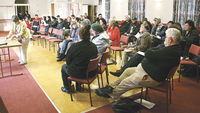 ‘Therese’ was still in shock as she folded her cleaner’s smock, turned and sadly left her workplace for the last time. Therese was taking part in a role play as a young cleaner who has just been unexpectedly sacked. She had no idea of her rights but neither did the boss who sacked her know her rights – or his.
‘Therese’ was still in shock as she folded her cleaner’s smock, turned and sadly left her workplace for the last time. Therese was taking part in a role play as a young cleaner who has just been unexpectedly sacked. She had no idea of her rights but neither did the boss who sacked her know her rights – or his.
An interdenominational seminar on July 3 in Wellington, ‘Blessed are the Workers!’ began with the role play to demonstrate the power imbalance between a worker and an employer.
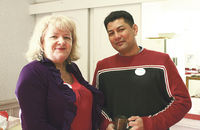 Service and Food Workers Union organiser Mea’ole Kiel then explained that the boss in the role play was in breach of the Employment Relations Act for not having provided a written employment agreement for the worker to consider. Because the worker had not agreed in writing to allow the employer to use the new 90-day ‘trial’, he could not legally sack her after two months by simply telling her ‘Don’t come Monday’. Mea’ole also explained that the situation was not uncommon, especially for migrant workers.
Service and Food Workers Union organiser Mea’ole Kiel then explained that the boss in the role play was in breach of the Employment Relations Act for not having provided a written employment agreement for the worker to consider. Because the worker had not agreed in writing to allow the employer to use the new 90-day ‘trial’, he could not legally sack her after two months by simply telling her ‘Don’t come Monday’. Mea’ole also explained that the situation was not uncommon, especially for migrant workers.
The first speaker at the seminar, Pacific Island Wellington school cleaner Mele Peaua, explained that ‘When I am happy at work, my family is happy, my church is happy, my community is happy and my country is happy. When I am not happy at work, my family is not happy, my church, community and country are not happy’. She spoke of the importance of her union in her life. Sharing stories and experiences played a key role in building solidarity and support among workers and their families for each other.
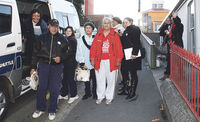 Engineers Union National Secretary Andrew Little painted the big picture with a history of labour legislation and its origins in the late 19th century in protecting workers from criminal charges for ‘combining’ to act collectively against the master-servant relationship which gave the employer all the power in employment relationships.
Engineers Union National Secretary Andrew Little painted the big picture with a history of labour legislation and its origins in the late 19th century in protecting workers from criminal charges for ‘combining’ to act collectively against the master-servant relationship which gave the employer all the power in employment relationships.
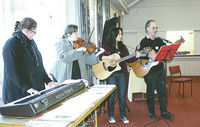 The role of churches in supporting workers seeking just working conditions was presented by two ministers of religion – vicar-general Fr Gerry Burns and Methodist minister the Rev Tavita Filomine. They both talked of their personal experiences of involvement in workers’ issues including actively supporting workers seeking justice through their union campaigns.
The role of churches in supporting workers seeking just working conditions was presented by two ministers of religion – vicar-general Fr Gerry Burns and Methodist minister the Rev Tavita Filomine. They both talked of their personal experiences of involvement in workers’ issues including actively supporting workers seeking justice through their union campaigns.
The Catholic Church has a strong tradition of social teachings stretching back to the Papal Encyclical of Pope Leo XIII in May 1891 – Rerum Novarum.
‘The problem of the day is the problem of the workers’, said Pope Leo at that time. Subsequent encyclicals have also clearly set out the importance of the role of unions in bringing justice and equity for workers, their families and wider society.
The seminar was organised by a small group of Wellington union members and church representatives to consider ways in which workers and churches can work more closely together.
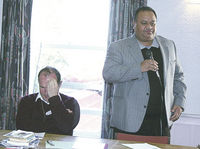 The organising committee included members of the Justice and Peace Commission of the Wellington Catholic Archdiocese, Wellington Catholic Peacemakers and the Service and Food Workers Union.
The organising committee included members of the Justice and Peace Commission of the Wellington Catholic Archdiocese, Wellington Catholic Peacemakers and the Service and Food Workers Union.
Because both the churches and the unions have strong music traditions, singing at the seminar included ‘Solidarity Forever’ and ‘Whakaaria Mai’.
The seminar participants decided to look at developing similar seminars (including for high school students), contributing items for their church and union newspapers, supporting migrant workers whose first contact may be with their church and encouraging church ministers to become more involved in their congregations’ work issues.
There are too many Thereses out there – we need more Meles, Fr Gerrys and Rev Tavitas.
Images: Top: group waiting to start; above left: Two of the organisers Monica O’Connell and Clark Figuracion; above right: Some of the Service and Food Workers’ Union members off to Kenepuru Hospital to start work after the seminar; Above left: the music group leading an important part of the meeting, Sue Windsor, Lisa Beech, Kaisa Beech and John Maynard; above right: Fr Gerry Burns and Rev Tavita Filomine. All photos: Mea’ole Keil